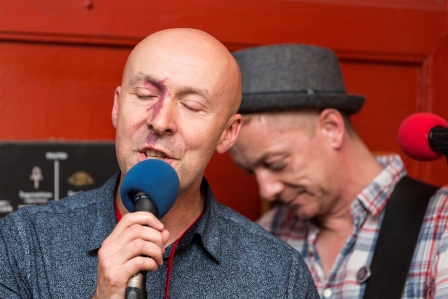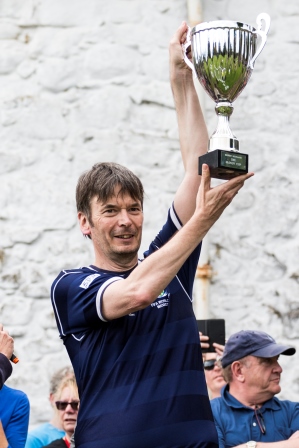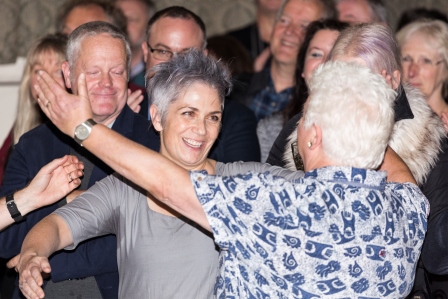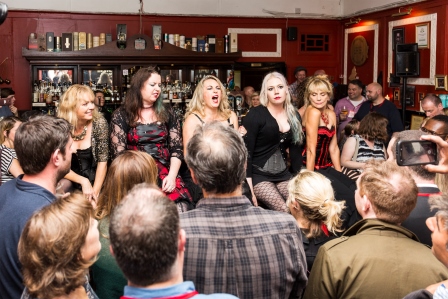IF
Stirling’s Bloody Scotland festival is a celebration of that peculiarly
Caledonian strand of crime fiction known as tartan noir, then this year’s event
may have given birth to an even more specialised sub-genre.
Midgie
noir.
That
was author Catriona McPherson’s suggested name for Scottish crime fiction that
takes place away from the mean streets of the big cities and off the beaten
track.
McPherson,
best known for her 1920s set period whodunnits, was representing her native
Galloway on a panel about Scottish rural crime with two writers who had chosen
to set their books in the Highlands, CF (Calum) Peterson, whose debut novel
Errant Blood is set in the fictional village of Duncul, and Yorkshireman
Michael Ridpath. An experienced author whose books include financial thrillers,
wartime spy stories and an Iceland set police procedural, Ridpath’s latest
novel Amnesia is set on the slopes of Ben Wyvis, although he did admit he
originally planned to place the action in the woods of Vermont.
Peterson,
who admitted creating Duncul to avoid any comparison to his home village,
summed up the appeal of the Highlands as a setting, commenting: “It wasn’t a
decision for me to set the book in the Highlands because I live there. I’ve
been back for 10 years and I’ve almost forgotten what it was like to live
anywhere else.
“The
Highlands are both real and unreal because the place is so mythologised. I live
beside Loch Ness and the whole economy is based on a myth.”
One
myth he did puncture was that the region was free of crime.
“There’s
all sorts of stuff that goes on,” he admitted, tongue slightly in cheek.
“Behind
the picture postcard look, the Highlands is a terrible place!”
One
member of the audience raised the suggestion that perhaps there was too much
Scottish set crime, but Englishman Ridpath quickly rejected that idea.
“As a
foreigner, I think Scotland’s a great location to pick on,” he said.
Peterson
agreed, adding: “There are millions more novels to be set in Scotland.”
McPherson
added that when it comes to fictional murder “we are still lagging behind
Midsummer” - though the authors attending Bloody Scotland are doing their best
to change that.
Joining
the more local authors were visitors from the US, India and Ireland as well as
elsewhere in the UK with the bigger names including Liberal Democrat politician
turned novelist Vince Cable, Prime Suspect creator Linda LaPlante and honorary
Scot Ann Cleaves joined by Douglas Henshall, the star of BBC series Shetland,
based on her island set crime series.
This
year’s festival, the sixth, again broke Bloody Scotland’s own box office
records, but even before the numbers were crunched, there was much to celebrate
at this gathering of practitioners and fans of Scotland’s most thriving
literary export.
That
included 30 years of Ian Rankin’s Inspector Rebus series, with the Fife-born
author confirming to a sell out audience at Stirling’s Albert Halls that he was
working on another case for the popular detective having started work on the
book at his home in Cromarty. Fellow Fifer Val McDermid also had an anniversary
to celebrate at her event, 30 years since the publication of the first of her
30 novels.
Crime
fans also shared the celebrations when Denise Mina was announced as the winner
of the McIlvanney Prize for crime writing with her remarkable stand-alone novel
The Last Drop, a popular and deserving choice.
The
award was presented in the Great Hall of Stirling Castle, a venue that has seen
its share of real life intrigue of the centuries and announced via video link
by judging panel member, comedian Susan Calman, who was stuck in London on her
Strictly Come Dancing commitments.
It was
followed by an eye-catching torchlit procession through the streets of the old
town led by Rankin, McDermid and Mina, before the festival continued with
Rankin’s event followed by irreverent quiz Never Mind the Buzzcops, full of
jokes and unlikely facts about crime writers – was Syd James really PD James’s
father? Was Ian Rankin really questioned as a murder suspect?
After
the quiz, three of the contestants, McDermid, Mark Billingham and Christopher
Brookmyre stayed on stage to become half of celebrity band the Fun Lovin’ Crime
Writers alongside Doug Johnstone (drums), Luc Veste (bass) and secret weapon
Stuart Neville, who displayed superb musicianship on lead guitar and harmonica,
for an energetic set of crime themed covers from rock, folk and country.. With
Billingham involved, that included an inevitable Johnny Cash cover, although
the writer did take the Man in Black to task for faulty research.
“If
you shot a man in Reno, you wouldn’t end up in Folsom State Prison. Completely
different jurisdiction,” he said.
Saturday
got under way with the usual round of author panels, including former Inverness
journalist Tony Black talking about drawing on his time in Australia for latest
novel Bay of Martyrs, while actor turned author John Gordon Sinclair admitted
he had gone for stroll on Google maps – a “stroogle” – rather than visit
Albania in person for his third book, Walk in Silence.
The
ever popular Peter May, author of the acclaimed Lewis Trilogy, was there to
talk about reaching the end of his French set series about forensic investigator
Enzo Macleod – leading interviewer Carrbridge author Lin Anderson to wonder if
he was related to her own series detective, fellow forensic scientist Rhona
MacLeod. He also revealed he will be returning to the Hebrides, and perhaps a
familiar character or two, with his next book, I’ll Keep You Safe.
While
most panels were good natured, there was a burst of anger during the panel that
brought together former police officers turned crime writers Kate London and
Claire MacKintosh from England and former Glasgow copper RJ Mitchell, with the
latter hitting out at the creation of Police Scotland as “the worst disaster
that has ever happened to policing in Scotland.”
Much
more good natured, although potentially libelous, was the live recording of
podcast Two Crime Writers and a Microphone with hosts Steve Cavanagh and Luca
Veste joined by guests Rankin, Billingham, Neville and Eva Dolan to swap
stories, deflate the pretensions of “literary” novelists and be very, very rude
about the President of the USA in a raucously funny warm-up to the always sold
out Crime at the Coo cabaret night in a nearby bar.
Fictional
and real life crime met when crime writer and farmer James Oswald shared the
stage with Inverness-born Professor Sue Black, regarded as one of the world’s
leading forensic anthropologists, although sometimes even someone of her
professional standing can fall short of the expectations of the public.
“When
you give evidence, the jury always believe they are experts in forensic science
because they saw last night’s episode of CSI,” she lamented.
She
also rejected the idea that Scotland should have its own “body farm” – a term
she finds disrespectful – a facility where bodies are left exposed to study the
effects of decomposition.
“I
always image saying: what if it was your son or your daughter that was left out
there?” she said, but also rejected the scientific value of such a project.
“The
first facility was set up by Bill Bass in America 30 years ago and it’s
advanced our understanding of the time of death not one scrap. The amount of
research that has come out of that facility in the last 10 to 15 years has been
next to nothing and its only value has been in collecting bones.”
With
stories, laughs and something to think about, that event was a fair representation
of the weekend as a whole, with authors and fans happily mingling in the bar
and after events.
Bloody
Scotland will return next year on the weekend of September 21 to 23.
BLOODY SCOTLAND PHOTO GALLERY

Torchlight Procession

Christopher Brookmyre - part of Fun Lovin’ Crime Writers

Another award for Ian Rankin!
Scotland 6 England 3

McIlvanney Prize for Crime Writing winner Denise Mina
being congratulated by Val McDermid

The Slice Girls liven up the proceedings!


Photos © Paul Reich